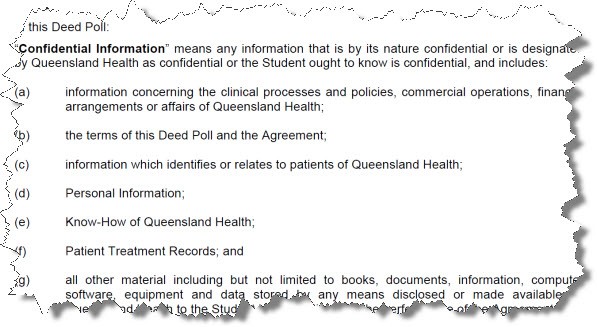A Queensland Health “gag order” banning medical students disclosing information inside hospitals has been slammed by students, who fear a premature end to their careers if they refuse to comply.
The so-called “Student Deed Poll” was sent this week to third year medical students at the University of Queensland who are about to undertake clinical rotations in the state’s hospitals. It threatens them with financial penalties for a “breach” of any one of the vaguely-worded 26 points drafted by Bligh government lawyers.
Students, who were not consulted about the document’s contents, are prevented from discussing any “confidential information” gleaned during their placements, despite the retention and circulation of data often being central to their medical training. Queensland Health aren’t required to prove malfeasance before slapping stressed students with an injunction — a mere “suspicion” of a breach is grounds for action.
Crikey understands that other states’ confidentiality agreements are drafted by universities, not health departments, and contain far fewer clauses than QH’s 2500 word, seven-page, 26-point monster. NSW Health’s clinical placements document contains basic information on police checks, however students are also required to sign the general NSW Health code of conduct.
“This QH document is unreasonable, goes well beyond protection of patient privacy and is about ‘gagging’ any commentary at all about any aspect of Queensland Health,” one irate student wrote on the University of Queensland Medical Society website. “I can’t imagine why Queensland Health thinks that any medical student particularly wants to spend their time gossiping … we honestly have better things to do with our time, such as study — this document is a product of paranoia and has no basis to be presented to students as a mandatory document.”
The deed even contains its own internal secrecy clause banning students from discussing its existence and its contents — despite its public availability on the Queensland Health website.
In some instances, students are required to write out “confidential” hospital information such as patient numbers on their assignments, an act that would put them in breach of the deed and expose them to lawsuits.
Other concerns include the deed’s “onerous and unreasonable” wording, the lack of prior consent and the waiving of the presumption of innocence usually granted under misconduct allegations. Students have no choice but to sign — a failure to complete third-year placements would halt their eventual graduation and employment as doctors and specialists.
In one clause, the document directs students not to “distribute, copy or take photocopies” of policies relating to particular procedures or medications. However, it is necessary for students to take home many of these documents to study thorny topics like post-operative thromboprophylaxis, the Warfarin Protocols and the Chest Pain Management Flow Chart.
In another scenario, a student discussing a patient’s medical history in a hospital corridor could be exposed to the possibility of court action.
Australian Medical Students Association President James Churchill said his organisation was investigating the document and expressed concerns over students’ invidious positions.
“We need to make sure the Queensland students are not being taking advantage of in their need to undertake their placements in Queensland Health,” he said. “I think the question here is whether the Queensland document is in the right spirit or overly complex or overly harsh. It’s putting these students in a very difficult position I think.”
The issue of medical secrecy is a sensitive topic in Queensland following the notorious case of Bundaberg surgeon Jayant Patel. Government prosecutors relied upon medical staff to blow the whistle with Anna Bligh lauding that the hospital employee who spoke up, Toni Hoffman, for her “great service by whistleblowing on an important case”. Hoffman received the 2006 Australian of the Year Local Hero Award for her role as a whistleblower.
UPDATE: After Crikey‘s deadline, Bronwyn Nardi — Queensland Health’s Acting Deputy Director-General of Policy, Strategy and Resources — released the following statement:
“All clinical staff and students need to understand that patient confidentiality is a critical part of this job.
“The duty of confidentiality is a long-standing requirement and is already enshrined in legislation.
“Whistleblower rights are also enshrined in legislation and nothing in the document removes them.”









Queensland Health has ‘form’ in many areas. Apparently it’s a preferred place for royalty to work – particularly Tahitian princes.
“waiving of the presumption of innocence”… better not give QPS any ideas.
I think Queensland Health is getting a bad rap here. The NSW Code of Conduct used as a less onerous comparison is 44 pages even if the acknowledgment that a NSW student signs agreeing to comply with it is a couple of pages. Having students acknowledge the confidentiality of the information they have access to is hardly unreasonable even if those with vested interests think any restriction unreasonable.
1984 – George Orwell
Queensland Health/government is attempting to do what governments right across Australia are doing. trying to limit the information which gets out. They are doing whatever they can get away with to keep information away from the grass roots community, whom they expect may react badly. I have not forgotten how over two years ago NSW Health tried to use their code of conduct to prevent NSW Health employees from exercising their civic freedoms to speak out against the Labor government for closing down our rehabilitation ward at Woy Woy Public Hospital. We who pay the taxes are the ones who should be dictating what our elected reps legislate or regulate. Do not forget The Bligh government has refused to discuss its reasons for paying a hundred and twenty thousand dollars to Annette McIntosh, 37, who is one of the living victims of Shreddergate – a 20-year controversy involving politicians, shredded documents child abuse and “hush money”. Politicians put self interest first ! Edward James